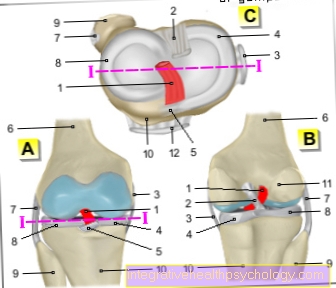Are children allowed to attend school?
definition
Detention, also called Silentium or rework, is an educational or regulatory measure that teachers use in school. It is a tool used when a student misbehaves or violates duties. Detention means that a student is not allowed to go home with the other students after the end of the class, but has to stay in school for a certain time and do certain tasks.
Detention is considered a mild form of the school's regulatory measures. In most federal states, the parents of underage pupils must be informed if the pupils are to be detained. The state school laws regulate detention.
You might also be interested in this topic: Means of education

Under what conditions can children be detained in school?
In principle, detention should be used as a regulatory measure if a student behaves badly, misses lessons or shows comparable school offenses. It is an educational method that serves the purpose of the student learning from his behavior and gaining insight. A child's misconduct is a prerequisite for detention in school. Rework must not be arbitrarily or abusively imposed on children.
Detention may only apply if the regulations of the federal states are complied with. Some federal states have clear information on the duration and implementation of detention, while other federal states regulate rework less strictly. If the federal state only allows two hours of rework, a previously fixed date in writing or the presence of a teacher, these regulations must be implemented during rework.
Also read the article on the topic: Defiance phase
How long can children be detained?
The duration of detention is determined differently in the federal states. In Baden-Württemberg a teacher can order up to two hours of rework and the school principal up to four hours. Detention is allowed in Brandenburg for a maximum of one lesson. It is important that the parents of underage students should be informed before the student is sentenced to detention.
When is detention a deprivation of liberty?
Detention is considered a deprivation of liberty if teachers do not adhere to the provisions of the School Act when ordering detention. These are regulated in Germany in the School Act and in some cases differ greatly in the various federal states. Detention is allowed in North Rhine-Westphalia if the parents are informed beforehand.
In August 2016, a teacher in Neuss was convicted of deprivation of liberty because he is said to have forced a student to stay in the room after class had ended. Detention actually constitutes a deprivation of liberty for students if this educational measure is abused or applied in a way other than as stipulated in the School Act. Teachers have to adhere to the regulations of the School Act when decreeing rework.
You might also be interested in this topic: Educational aid- what is it?
What law regulates detention?
Detention is regulated in Germany in the school laws of the various federal states. In Baden-Württemberg, for example, the school law states that a teacher may order detention for a maximum of two hours, while detention for up to four hours must be issued by the school principal (Section 90 (3) SchulG BW). Detention is permitted in Schleswig-Holstein, North Rhine-Westphalia and Hamburg provided the parents have been notified beforehand (Section 25 Schleswig-Holstein School Act, Section 53 Paragraph 2 School Act NRW, Section 49 Paragraph 1 Hamburg School Law).
Detention is allowed in Bavaria, but only with supervision by a teacher and an appointment agreed in advance in writing. In Rhineland-Palatinate, detention, i.e. staying longer without reworking, is not permitted (Section 83 (1) ÜSchO Rh-Palatinate). This means that detention is only allowed there to rework missed course material. In Saxony, on the other hand, there are no specific regulations on detention in the School Act.
Does detention make sense from an educational point of view?
Whether detention makes sense from an educational point of view depends on the situation. There must be clear misconduct on the part of the student, for example skipping classes. If the student has to work through the missed subject matter as part of the rework and loses valuable time in the afternoon, it can help the student to understand his wrongdoing. If detention is used very frequently and arbitrarily as a punishment, it is educationally worthless and causes most pupils to behave dull and motivated.
At this point it is also important which role the school break plays in the child's concentration. Read more about this at: The school break
Recommendations from our editorial team
- Upbringing stems
- Behavioral problems in children
- Form of instruction
- Parental leave





























